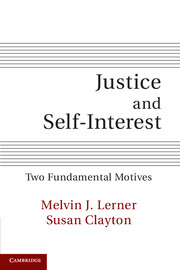Book contents
- Frontmatter
- Contents
- List of Figures and Tables
- Preface
- 1 Contesting the Primacy of Self-Interest
- 2 Why Does Justice Matter? The Development of a Personal Contract
- 3 Commitment to Justice: The Initial Primary Automatic Reaction
- 4 Explaining the Myth of Self-Interest
- 5 Defining the Justice Motive: Reintegrating Procedural and Distributive Justice
- 6 How People Assess Deservingness and Justice: The Role of Social Norms
- 7 Integrating Justice and Self-Interest: A Tentative Model
- 8 Maintaining the Commitment to Justice in a Complex World
- 9 Bringing It Closer to Home: Justice in Another “American Tragedy”
- 10 Emotional Aftereffects: Some Negative Consequences and Thoughts on How to Avoid Them
- References
- Author Index
- Subject Index
9 - Bringing It Closer to Home: Justice in Another “American Tragedy”
Published online by Cambridge University Press: 03 May 2011
- Frontmatter
- Contents
- List of Figures and Tables
- Preface
- 1 Contesting the Primacy of Self-Interest
- 2 Why Does Justice Matter? The Development of a Personal Contract
- 3 Commitment to Justice: The Initial Primary Automatic Reaction
- 4 Explaining the Myth of Self-Interest
- 5 Defining the Justice Motive: Reintegrating Procedural and Distributive Justice
- 6 How People Assess Deservingness and Justice: The Role of Social Norms
- 7 Integrating Justice and Self-Interest: A Tentative Model
- 8 Maintaining the Commitment to Justice in a Complex World
- 9 Bringing It Closer to Home: Justice in Another “American Tragedy”
- 10 Emotional Aftereffects: Some Negative Consequences and Thoughts on How to Avoid Them
- References
- Author Index
- Subject Index
Summary
In this chapter, we develop one of the scenarios introduced in Chapter 1 – the decision to institutionalize an elderly relative – in order to illustrate the main themes we have introduced, and in particular to stress the subtle but pervasive ways in which the drive for justice can affect our lived experiences in profound and, at times, tragic ways. This is very much an American story; relevant cultural mores and institutional structures would lead to different outcomes in many other societies. However, the way in which rational actions lead to unanticipated justice-based reactions can be experienced in any country.
The beginning of a common scenario occurs when elderly parents can no longer deny the inevitable fact that they are unable to meet all their needs for independent living. The increasing physical frailties and/or problems of mental functioning, together with the deterioration of their support networks will, in time, require the elderly to seek help in their daily self-sustaining activities. It is not commonly recognized in this country that the vast majority of the elderly, though they would greatly prefer to maintain their independence, turn to members of their families for this assistance, and in most cases a female member of the family becomes a primary caregiver or care manager with varying amounts of assistance from other family members (Brody, 1985).
- Type
- Chapter
- Information
- Justice and Self-InterestTwo Fundamental Motives, pp. 207 - 219Publisher: Cambridge University PressPrint publication year: 2011



